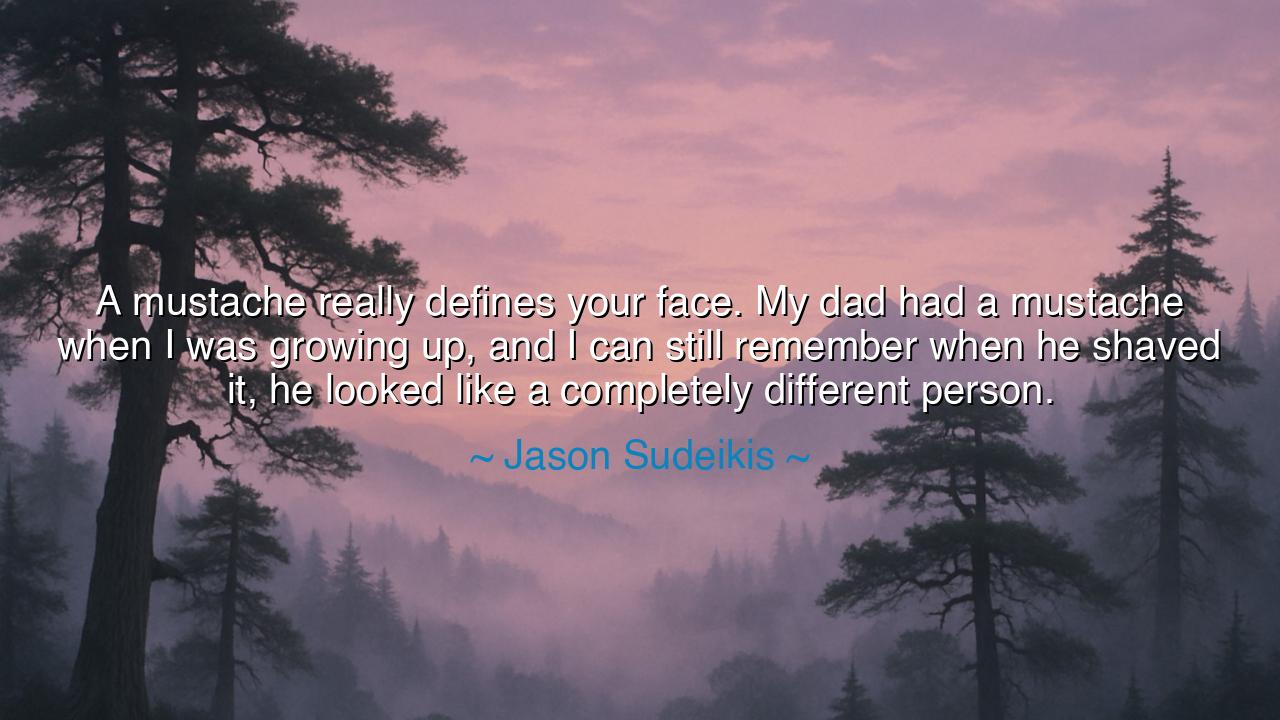
A mustache really defines your face. My dad had a mustache when I
A mustache really defines your face. My dad had a mustache when I was growing up, and I can still remember when he shaved it, he looked like a completely different person.






In a reflection both tender and profound, Jason Sudeikis once said: “A mustache really defines your face. My dad had a mustache when I was growing up, and I can still remember when he shaved it, he looked like a completely different person.” Though his words seem simple — an observation born of childhood memory — within them lies a deeper meditation on identity, transformation, and memory. For in speaking of a mustache, Sudeikis is not merely describing the physical, but revealing how we come to recognize and revere those we love, how a single familiar feature can hold an entire world of meaning.
The mustache, in this telling, becomes a symbol — a mark of character, of presence, of familiarity. To a child, a father’s face is the first map of the world, the first form of security and wonder. When that face changes, even in something so small as the shaving of hair, it can feel as though the earth itself has shifted. What Sudeikis captures is not vanity, but the power of symbols in shaping human connection. A face, after all, is not only seen but remembered — and in that memory, every feature becomes sacred. His father’s mustache was more than adornment; it was identity itself, a constant that defined the man in his eyes.
The origin of this truth runs deep in human nature. Across ages and cultures, the face has always been the mirror of the soul — the part of us by which others know and remember who we are. Ancient kings and warriors grew beards and mustaches as emblems of wisdom and strength; priests and monks shaved them to symbolize humility and renunciation. In every tradition, the face has been a canvas for meaning — a reflection of who we wish to be and how we wish to be seen. Thus, when Sudeikis recalls his father’s transformation through the loss of a mustache, he touches an ancient truth: that even the smallest changes in outward appearance can unsettle the heart, because we bind emotion to image.
Consider the story of Samson, the mighty judge of Israel, whose hair was the vessel of his strength. When Delilah cut it, he did not merely lose his power — he lost a part of his identity, the symbol by which he understood himself and by which others revered him. Though a mythic tale, it holds a human lesson: the external often reflects the internal, and when it changes, so too does our perception of the person within. To young Sudeikis, his father’s mustache was a crown — and when it was gone, the man before him was both familiar and foreign. It is the timeless moment when a child realizes that even those we love most deeply are not fixed, but ever-changing, like the tides of time.
There is a quiet poignancy in this revelation. Beneath the humor lies a truth about the fragility of memory and the impermanence of identity. We are creatures of attachment — we hold on to faces, voices, gestures, as if they will never change. Yet change is the law of life. The father who shaved his mustache was the same man, yet to the child he appeared reborn — a living reminder that time reshapes all things, and that the essence of a person lies not in their form, but in their heart and presence. Sudeikis, with an artist’s sensitivity, captures this moment when the familiar becomes strange — and in doing so, he honors the love that makes such change meaningful.
The lesson that flows from this reflection is one of recognition and acceptance. We must learn to see beyond the surface — to understand that those we love will change, and that we ourselves will change, too. Faces age, voices deepen or fade, the symbols that once defined us are lost or renewed. Yet the spirit remains, constant beneath the shifting mask. To cling only to the outward is to risk losing sight of the soul within. Let us, therefore, practice seeing others not for what they appear to be, but for who they truly are — a spirit that no razor, no time, no change can erase.
So, my children of the future, remember the wisdom hidden in Jason Sudeikis’s words. The mustache, the face, the outward form — these are but the garments of the eternal self. Cherish the symbols, but never mistake them for the substance. When those you love change — as they must — meet them with wonder, not fear. For it is through change that we rediscover one another anew, and through recognition that love remains. And when you look into the mirror and see that time has touched your own reflection, smile, for you too are a story being rewritten — and there is beauty in every version of your becoming.






AAdministratorAdministrator
Welcome, honored guests. Please leave a comment, we will respond soon